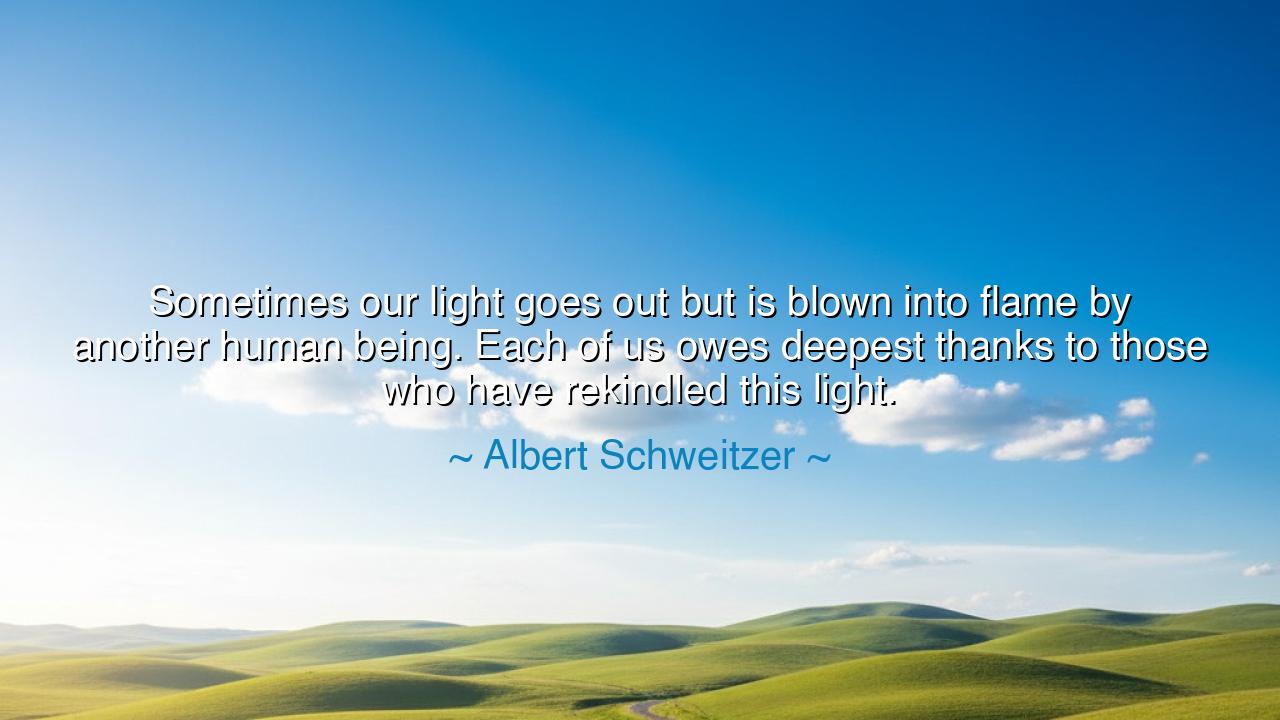
Sometimes our light goes out but is blown into flame by another
Sometimes our light goes out but is blown into flame by another human being. Each of us owes deepest thanks to those who have rekindled this light.






The words of Albert Schweitzer, “Sometimes our light goes out but is blown into flame by another human being. Each of us owes deepest thanks to those who have rekindled this light,” resound with the voice of timeless wisdom. They speak to the fragility of the human spirit, and at the same time to the sacred power of human connection. For who among us has not known moments when the flame within us grows dim, when hope falters, and strength wavers? Yet Schweitzer reminds us that the hand, the word, or the presence of another can stir the embers of our soul back into brightness. In this, he captures both the humility of needing others and the nobility of serving as a bearer of light for another.
To say “our light goes out” is to acknowledge that even the strongest hearts are not unbreakable. The ancients knew this well: even heroes grew weary. Achilles withdrew in anger, Hector trembled before battle, and the mighty kings of Israel cried out in despair. Light is a symbol of life, of purpose, of courage. When it falters, a man feels lost in shadow. Yet Schweitzer, physician and philosopher, assures us that such darkness is not final. There are others, fellow travelers on the road of life, whose words or deeds can restore what we thought was gone.
The phrase “blown into flame by another human being” is an image of resurrection. Just as a dying ember glows again when fanned with breath, so too the human soul can be revived by kindness, encouragement, or love. History offers many examples. Consider Winston Churchill during the Second World War: his own fire of determination was rekindled not only by his inner resolve but by the courage of the British people who stood behind him during the Blitz. Their endurance fanned his flame, and his words fanned theirs in return. Thus the cycle of light continued, each heart keeping the other burning.
Schweitzer also teaches us the importance of gratitude: “Each of us owes deepest thanks.” It is not enough to be rekindled; we must remember the ones who lifted us when we faltered. Gratitude is the mark of wisdom, for it binds us to those who gave of themselves, ensuring that their light is honored and never forgotten. In ancient Rome, soldiers who survived battle often raised altars of thanksgiving to the gods, but also inscribed the names of comrades who had saved them. In like manner, Schweitzer calls us to recognize the unseen saviors of our everyday lives.
This truth is not abstract but deeply personal. Each of us can recall a teacher who believed in us when we doubted ourselves, a friend who stood by us in grief, a stranger whose kindness gave us strength. These are not small acts; they are holy sparks. In acknowledging them, we honor the mystery of life — that we are not meant to carry our burdens alone, but to walk together, fanning one another’s light when it flickers.
The lesson for us is clear: be both humble enough to receive rekindling, and generous enough to give it. Do not be ashamed of moments when your flame falters, for this is part of being human. And when you see another’s light fading, do not pass by indifferently — breathe words of encouragement, extend compassion, offer presence. In this way, we become guardians of one another’s souls, keeping alive the sacred fire of humanity.
As practical action, reflect on who has rekindled your light. Offer them your thanks, whether in word, in letter, or in deed. Let them know the depth of their impact. Then, seek to be that presence for another: listen to the weary, lift the discouraged, stand beside the lonely. Remember, even the smallest act — a smile, a kind word, a gentle hand — can turn dying embers into flame.
Thus, Schweitzer’s words endure as a teaching for all ages: our light is not eternal alone, but shared, sustained, and rekindled by one another. To live in gratitude for those who reignite us, and to live as ones who reignite others, is to walk the path of true humanity. For in the end, the world is not sustained by solitary flames, but by the great fire we keep together.






AAdministratorAdministrator
Welcome, honored guests. Please leave a comment, we will respond soon